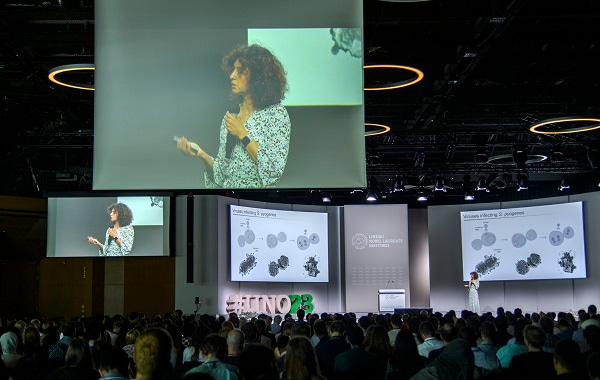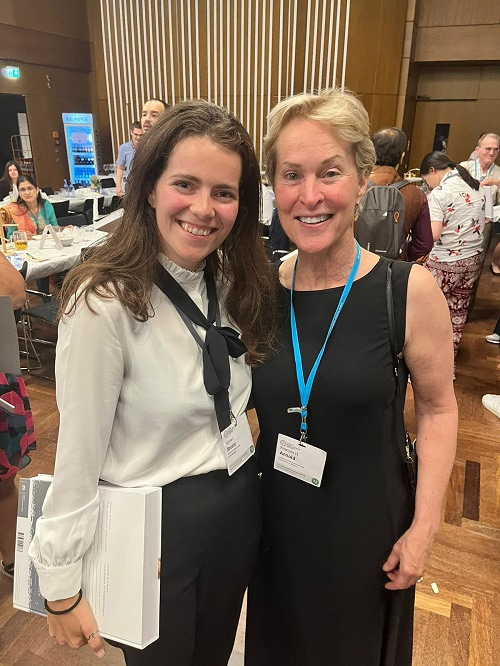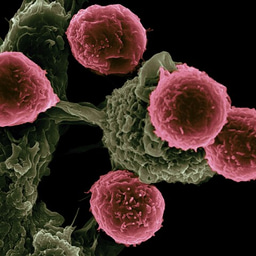Nobel laureates mentoring the next generation of scientists: insights from an early-career researcher

The Lindau Nobel Laureate Meeting gathers once every year with Nobel Laureates and early-stage researchers from around the world. However, the meeting specifically for Medicine and Physiology is held every three years and participants can only attend once in a lifetime, unless they win a Nobel Prize. To apply to become a nominee for the meeting, the researcher must be younger than 35 and be on the last year of a doctoral degree or have completed up to five years of postdoctoral research. The internal competition in the UK requires a resume, a letter of motivation, as well as a letter of reference, which was issued by the Nobel Laureate Sir Paul Nurse, who happens to be the director of The Francis Crick Institute where I was doing my postdoctoral research.

Lecture of Nobel Laureate Emmanuelle Charpentier during the 72nd Lindau Nobel Laureate Meeting.
Photo credit: Lindau Nobel Laureate Meetings
The meeting is held in Lindau, Germany and this year 39 Nobel Prize winners gathered with around 600 researchers. The Lindau meeting covers a variety of scientific topics, from neurobiology to climate change, from artificial intelligence to global health or from cancer to diversity. Besides lectures and agora talks, the meeting has a versatile programme that enhances the discussions between participants and Laureates through open exchanges, workshops, lunches, or walks. It was an honour to be selected to attend this meeting. I will never forget the advice of Frances H Arnold referring to the proposal of ideas or the pursue of career goals: she told us that we don’t have to be perfect, we just need to be good enough. Meeting young principal investigators and getting their tips on how to establish a laboratory was inspiring and it will significantly expand the horizons of my future research.

Nobel Laureate Frances H Arnold with Alicia L Bruzos
during the 72nd Lindau Nobel Laureate Meeting. Photo credit: Camilla Elbæk
The organization of the event seeks to inspire the young generations and aims to spread the spirit of an open, cooperative science community; therefore, ethical and societal issues are usually addressed in several sessions. However, not everybody likes this approach of not sticking only to the science. This year, a controversy about sexism in science arose during the structural biology session, in which Kurt Wüthrich claimed antimale discrimination for science not being the main focus of the meeting. I think it is sad that some Nobel Laureates think that there is no more sexism in science and that they see the measures to avoid it as a danger. Fortunately, hallway conversations and reactions to Science magazine news echoing the incident are a proof that not everyone thinks alike.
Do not hesitate to contact me if you are thinking of applying to attend the Nobel Laureate Lindau meeting. Event and accommodation expenses are covered by the institution that nominates you, which for me was The Royal Society, and the Mangold fellowship covered all my travel expenses. It’s a great opportunity to network and learn a bit about Bavaria, and it was the best conference I have ever attended.
Sources:
- The Lindau Nobel Laureate Meetings website: https://www.lindau-nobel.org/
- “A Nobel laureate claimed antimale discrimination. An early-career researcher called it out.” 30 Jun 2023. Science AAAS. doi: 10.1126/science.adj5116
Top image: Young scientists and Nobel Laureates during the 72nd Lindau Nobel Laureate Meeting. Photo credit: Lindau Nobel Laureate Meetings





Join the FEBS Network today
Joining the FEBS Network’s molecular life sciences community enables you to access special content on the site, present your profile, 'follow' contributors, 'comment' on and 'like' content, post your own content, and set up a tailored email digest for updates.